FunctionList Confused
-
@guy038 ,
That made sense, and I can use that to play with, because it did what I was trying to, although, so far, Peter’s and your contribution to it works great.
I was curious, however if I play with it further, and maybe Peter can also verify or deny, if I can get NPP to make it’s display look more like the dBASEPlus editor’s if I work more at the regex in the parser. Not so much the graphics, as just the way it breaks down the class, objects and functions etc. If not, believe me, what you guys did is fine…I’m just curious if it’s possible or not. Screenshots of both on Identical file.
dBASEPlus:
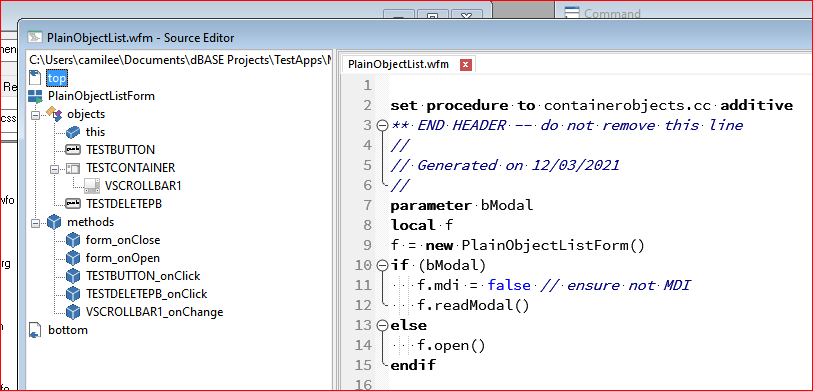
Notepad++:
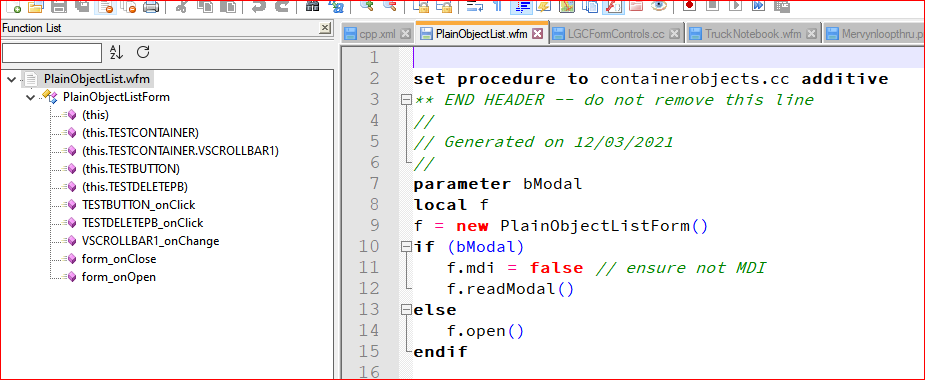
Yeah or nay? :-)
Lee
-
@lycan-thrope
Maybe with the regex I can change the names to drop the ‘this.’ and burrow down to the name of the object itself I guess is what I would mean. I’m going to play with it anyway, I just don’t want to break it. :-)Lee
-
@lycan-thrope
As a note, Peter, thanks for that code. I had forgotten an older but not obsolete alternative tofunctionin the dBASE language, namelyprocedurethat is essentially the same as a function’s syntax. It used to be used pre OOP days, and dBASE used to differentiate them, but that disappeared when it went OOP, but it was never removed and maintained to be compatible because the OOP version is still able to run older procedural code and it’s still recognized.I was able to figure out how to add that in the OR that you had setup, and the first time I ran it, it showed that it was highlighting a different aspect of dBASE, where you can
set procedure toa file that has external code and it highlighted the wordtoand included it in the FunctionList panel, so I was able after learning from guy038 the different way to write regex to (!to) and successfully run it without error. Learning a lot from you guys. :-)Just feeling good about that…not as good as you guys yet ;), but working on it.
Lee
-
P PeterJones referenced this topic on
-
@lycan-thrope
Hey Folks,I found a bit of a problem. I searched the forums to see if there was a previous issue with FunctionList words being found inside comments, and I think even Peter made a comment in it that it still had a bug that required to spaces or some such to keep it from listing in the FunctionList.
So, I double checked and the following screenshots show my problem with apparently any time a keyword (function, procedure, with/endwith) shows up in any comment. I know I didn’t regex the (&& comment characters) but it doesn’t seem to make any difference as it shows in this screenshot:
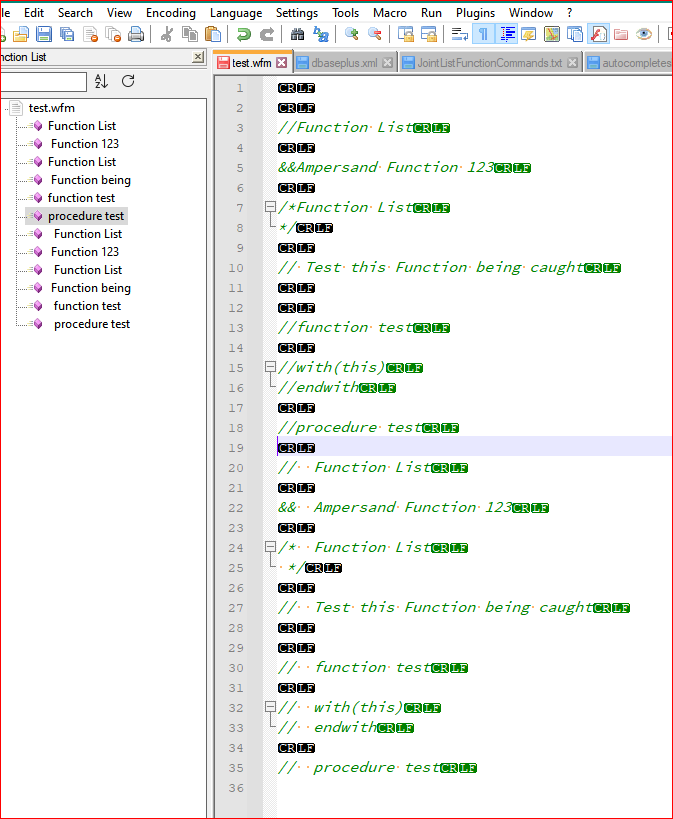
I also checked to make sure the comments were being considered by rechecking the FunctionList regex for the comments symbols (// and /* */) and they were as the screenshot shows, these are standard comment symbols that are supposed to be ignored:
I also tried to change the regex in the search to not include comment symbols from the start of the line search, by using a similar regex like I used to exclude “to”.
(! // | && | *)All this did was stop even the legitimate finding of functions from working altogether.
So I guess the question is, has this bug been fixed, or is there some way I can exclude these Functions from being found inside comments and listed?
Thanks in advance for any help and wishing all a Happy New Year during these holidays,
Lee
-
@lycan-thrope
OOps forgot the second screenshot showing the regex for the standard comments here:

Thanks , again,
Lee
-
Hi, @lycan-thrope,
Be patient
4/6hours. I’ll have a look into your problem. I think I’ve got a work-aroud to solve the detection of the wordFunctionin comments !Best Regards,
guy038
-
@guy038 ,
Thanks. Patience, fortunately or unfortunately, is one of my virtues. :-)
I have to get back to work documenting our common methods for the hints as well as our ADO components.
Thanks,
Lee
-
My first, with no proper comment defined, shows functions found in both comments and non-c omments:
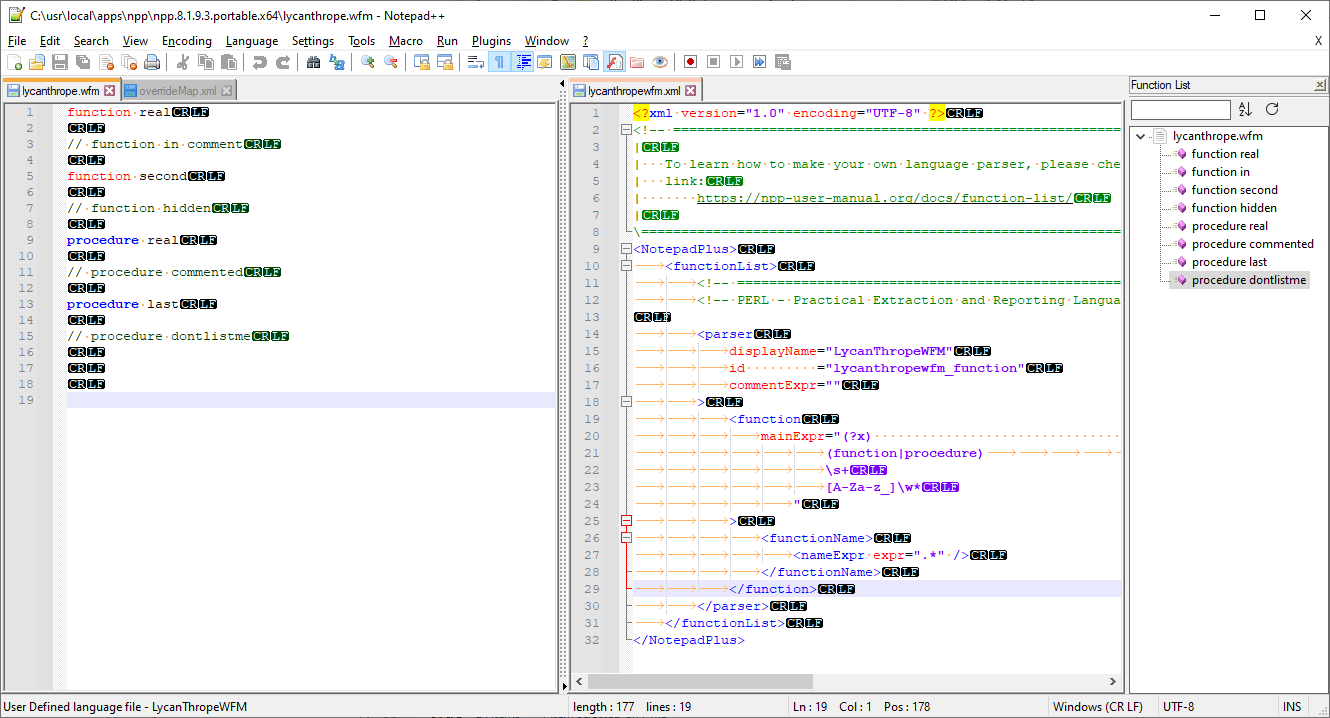
My second attempt, just adding in the
//comment expression does not show the functions from the comments: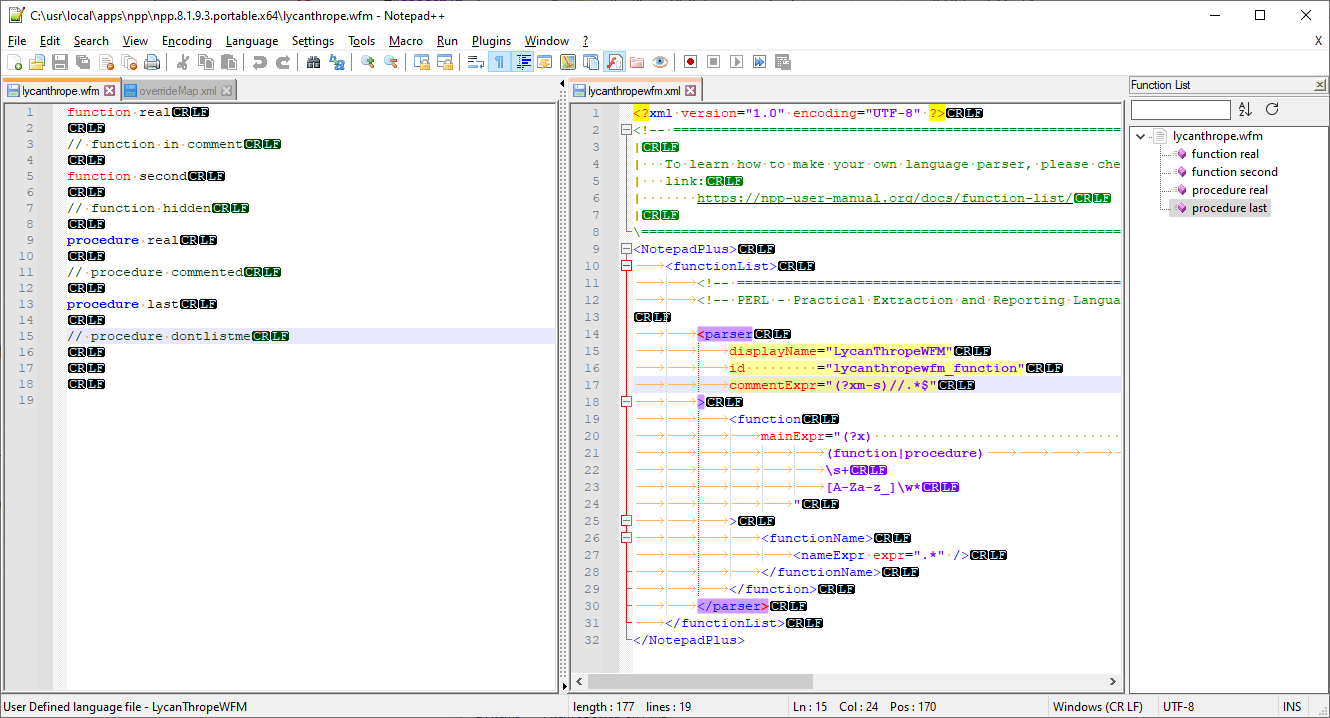
Now add in the
/*...*/-style comments to the UDL, but not to the functionList (though I did update to put the//inside the modified group), and restart:
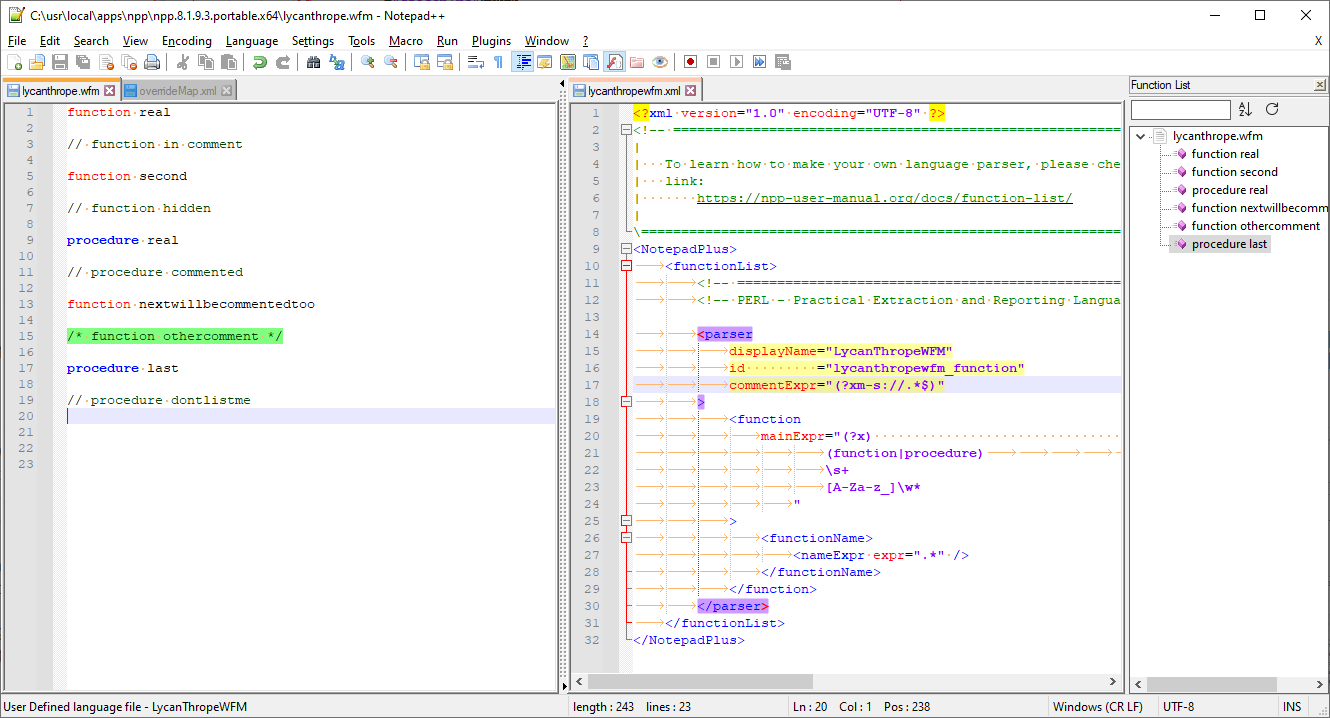
As expected, it shows
/* function othercomment */asfunction othercommentin the functionList. Now edit the comment regex to include an alternate comment definition and restart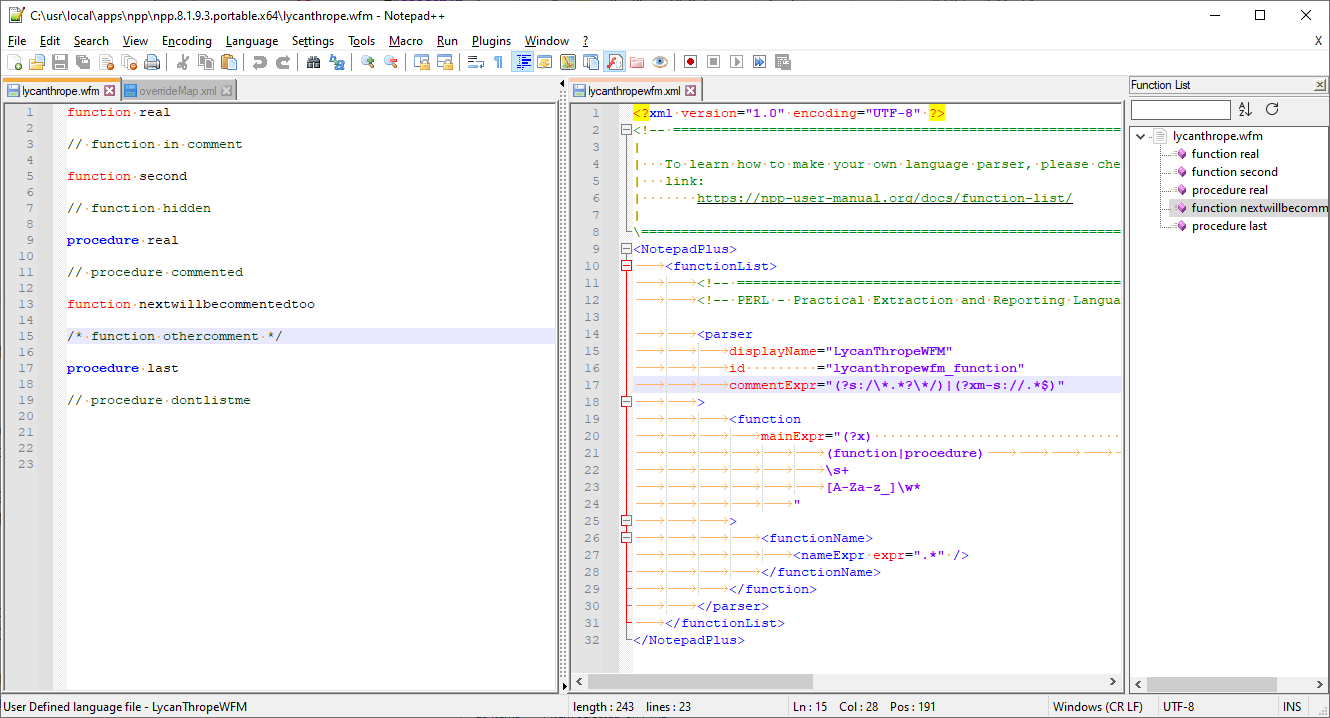
It works exactly as I would expect. FunctionList shows
real,second,real,nextwillbecommentedtoo, andlast, without showing any ofin comment,hidden,commented,othercomment, ordontlistme.As I have done in all the times I have given suggestions in your various forays into UDL, FunctionList, and AutoComplete – though I may not have said it explicitly enough – I always work incrementally in these: start with something that is working, then modify it to try one small thing new, and then either debug until it works or move forward to the next step if it does work. For you to make progress, you are going to have to do the same thing.
<?xml version="1.0" encoding="UTF-8" ?> <!-- ==========================================================================\ | | To learn how to make your own language parser, please check the following | link: | https://npp-user-manual.org/docs/function-list/ | \=========================================================================== --> <NotepadPlus> <functionList> <parser displayName="LycanThropeWFM" id ="lycanthropewfm_function" commentExpr="(?s:/\*.*?\*/)|(?xm-s://.*$)" > <function mainExpr="(?x) # Utilize inline comments (see `RegEx - Pattern Modifiers`) (function|procedure) # works with functions or procedures \s+ [A-Za-z_]\w* " > <functionName> <nameExpr expr=".*" /> </functionName> </function> </parser> </functionList> </NotepadPlus>Oh, sorry, I just saw that you have added
&&as a new comment. I will assume those are single-line comments as well, like//. So i used(?s:/\*.*?\*/)|(?xm-s:(//|\&\&).*$)in Notepad++ search first, and verified it also found&& procedure ampersandin addition to the other comment lines. So then I change the commentExpr and save and restart Notepad++: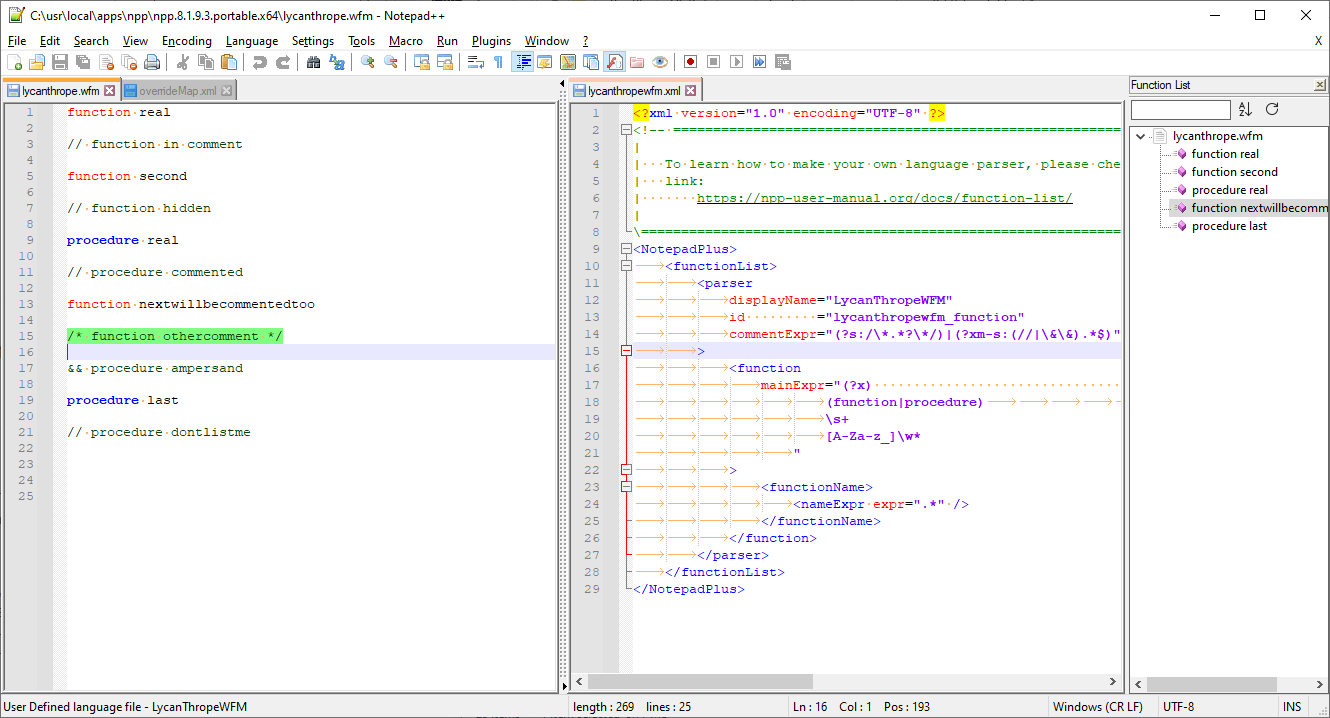
Once again, it works exactly as I would expect. I also removed the
\before the&, because that’s only special in the subsitution/replacement, not in the search, and it still works.Oh, you also don’t have the x in the modifier list. But when I remove it, it still works right:
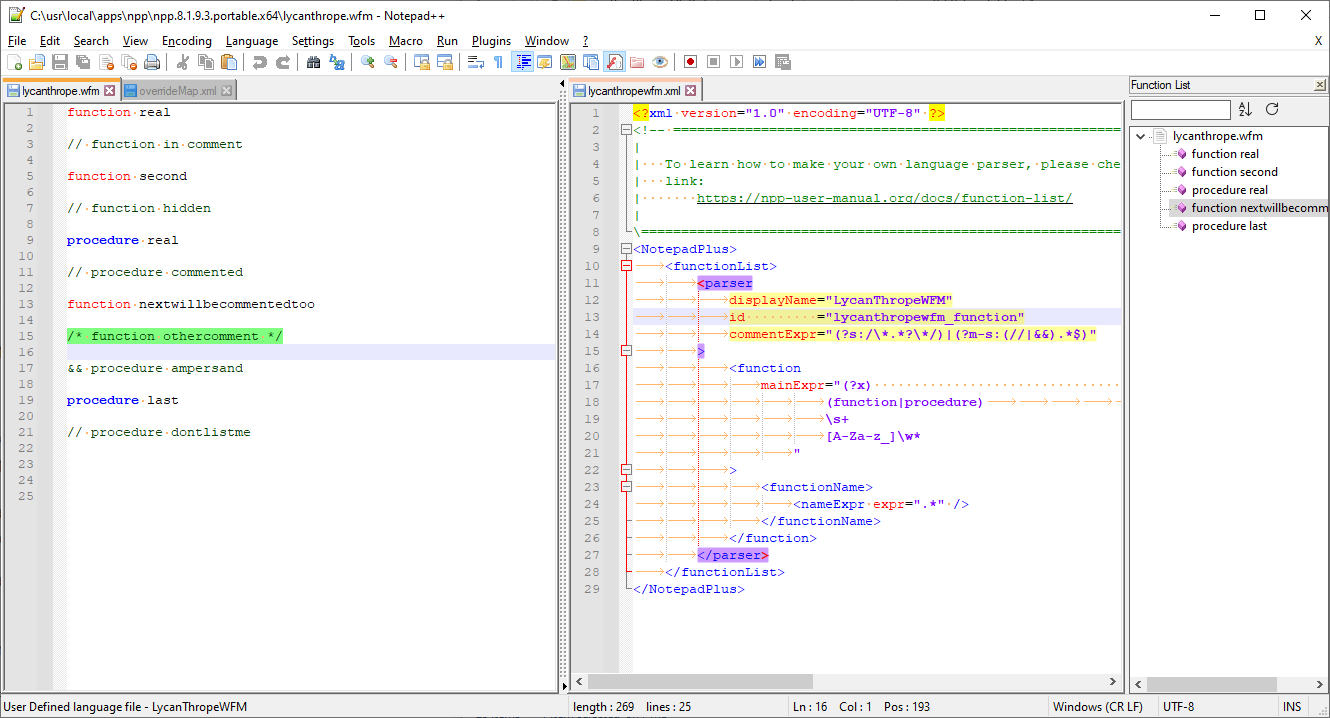
<?xml version="1.0" encoding="UTF-8" ?> <!-- ==========================================================================\ | | To learn how to make your own language parser, please check the following | link: | https://npp-user-manual.org/docs/function-list/ | \=========================================================================== --> <NotepadPlus> <functionList> <parser displayName="LycanThropeWFM" id ="lycanthropewfm_function" commentExpr="(?s:/\*.*?\*/)|(?m-s:(//|&&).*$)" > <function mainExpr="(?x) # Utilize inline comments (see `RegEx - Pattern Modifiers`) (function|procedure) # works with functions or procedures \s+ [A-Za-z_]\w* " > <functionName> <nameExpr expr=".*" /> </functionName> </function> </parser> </functionList> </NotepadPlus>So, I cannot replicate your problem. If I am inside the parser’s
commentExprregion, the parser will not identify the function/prcedure for me. -
Hello, @lycan-thrope,
Finally, as we all tried numerous ways to to get a functional parser, the best would be to send me, first, the last version of your
dBAsePlus.xmlfile, as text, of course !If you mind a possible lack of confidentiality, here is my temporary e-mail address :
Sorry for this delay !
BR
guy038
-
I don’t know how to explain it, Peter. I pretty much left the file alone after we did our thing and then I made that one change to keep the to out that I posted above to stop
procedure tofrom printing theto. I actually need to stop anyset procedure tofrom being recognized, but for the time, that was enough as long as the other stuff worked. I sent it out to some users to test for me and they reported the problems, and then I duplicated it…in that screenshot above.Prior, none of my code has those keywords in my comments, that’s why I didn’t notice it…but that’s the way it was, so I’m at a loss to explain it, but I am back to checking the regex and such.
Here’s my code:
<?xml version="1.0" encoding="UTF-8" ?> <!-- ==========================================================================\ | | To learn how to make your own language parser, please check the following | link: | https://npp-user-manual.org/docs/function-list/ | \=========================================================================== --> <NotepadPlus> <functionList> <!-- ========================================================= [ dBASEPlus ] --> <parser displayName="dBASEPlus" id ="dbaseplus" commentExpr="(?s:/\*.*?\*/)|(?m-s://.*?$)|(?m-s:\&\&.*?$)" > <classRange mainExpr="(?x-i) # Free-spacing mode and inline comments + search sensitive to case ^\h* # Optional leading whitespace chars class # 'class' keyword \h? # Optional whitepace char \w+ # Class name # Following the class name there is the option of parameters, and if so the first entry inside the parens is required, whether there is other # parameters or not, once the parens go up, the first is required. ie: class FrameCtrl(frameObj) ( # Beginning of the optional parameter(s) part ( Group 1 ) \h? \( # Opening parenthesis \w+ # First and required parameter ( , \h? \w+)* # Following optional/additional parameters \) # Closing parenthesis )? # End of the optional parameter(s) part # For the rest of the class declaration, after the class name, all other options are part of one big optional set, that follows 'of' # and can be populated by one of several options. (?: # Beginning of the main optional part, in a non-capturing group # The first and most prevalent is the Superclass name that the class is being subclassed from, and it's options of parameters and again, # if it has parameters, at least the first one is required ie.: class ToolButtonFx(oParent) of Toolbutton(oParent). \h of \h # Optional 'of' keyword, surrounded by 1 horizontal whitespace char \w+ # Superclass name (?1)? # Optional parameter(s) part ( Subroutine call to Group 1 ) # The next possible option is that it is a custom object and needs to be in this line so if the object or form is opened up in the dBASE IDE, # the designers in it won't mess up the object by streaming out missing parts or overriding properties or objects and functions. ( \h custom )? # Optional 'custom' keyword # The next possible option is that the class is being subclassed from another object that is contained elsewhere and the compiler needs to know # this reference. There are two options for pointing to the file. The first is an Alias path in the IDE that can be accessed by the compiler # in the environment, or second, it is in the current directory and only the name is needed...or it has a path that can be listed here, # but this is bad practice, and an Alias is recommended if the file is in a place other than the current directory. If it is, the name can be # used in quotes as a string that gets passed to the compiler. Both follow the word 'From'. The Alias directory is a name that is enclosed # in two colons, one immediately before the Alias name and one immediately after, no spaces. (?: # Beginning of the optional part, in a non-capturing group \h from \h # Optional 'from' keyword, surrounded by 1 horizontal whitespace char (?: # Beginning of a non-capturing group : \w+ : \w+ \. \w+ # First pointing file case | # OR \x22 \w+ \. \w+ \x22 # Second pointing file case ) # End of a non-capturing group )? # End of the optional part )? # End of the main optional part $ # End of current line and end of the class declaration (?s:.*?^\h*endclass) # must match all the way to 'endclass' " closeSymbole="endclass" > <className> <nameExpr expr="(?x-i) # Free-spacing mode and inline comments and search sensible to case \h* # Optional leading whitespace chars class # 'class' keyword \h? # Optional whitepace char \K\w+ # Pure class name " /> </className> <function mainExpr="(?x-s) \h* (?: function \h+ \w+ | procedure \h+ \w+ | with \h+ \(.*?\) ) \h* " > <functionName> <funcNameExpr expr="(?x-s) # multiline/comments # (! // | && | * ) trying to keep following keywords from being included in comments \h* # allow leading spaces (?: function # must have word 'function' as first word \h+ # must have at least one horizontal space after function \K # don't keep 'function' in the name of the function in the panel \w+ # the name of the function is the first whole word after 'function' | procedure # must have word 'procedure' as first word \h+ # must have at least one horizontal space after procedure \K # don't keep 'procedure' in the name of the function in the panel (!to)\w+ # the name of the function is the first whole word after 'procedure' - 'to' # so as to exclude any 'set procedure to' statements, needs work though. | with # must have word 'with' as first word \h+ # must have at least one horizontal space after function \K # don't keep 'with' in the name of the function in the panel \( # start paren .*? # 'this' or equivalent \) # end paren ) " /> </functionName> </function> </classRange> <function mainExpr="(?x-s) \h* (?: function \h+ \w+ | procedure \h+ \w+ | with \h+ \(.*?\) ) \h* " > <functionName> <funcNameExpr expr="(?x-s) # multiline/comments \h* # allow leading spaces (?: function # must have word 'function' as first word \h+ # must have at least one horizontal space after function \K # don't keep 'function' in the name of the function in the panel \w+ # the name of the function is the first whole word after 'function' | procedure \h+ \K (!to)\w+ | with # must have word 'with' as first word \h+ # must have at least one horizontal space after function \K # don't keep 'with' in the name of the function in the panel \( # start paren .*? # 'this' or equivalent \) # end paren ) " /> </functionName> </function> </parser> </functionList> </NotepadPlus> -
@guy038 ,
I sent the FunctionList file and an example program that I’ve been using, it’s small but if you throw comments in you may see it. I was just using a blank document to put those comments in with a .wfm extension to trigger the FunctionList.
Lee -
@lycan-thrope
Awww crap, I think I just saw the problem in this color-coded viewer on the forums. Need to check it out. :(Lee
-
@lycan-thrope
Not sure if I made it worse or not. ::sigh::
The one change I did do, which was changed thefuncNameExprthat’s supposed to find just the functions, tonameExprseem to change my test set, to lose the Function/Procedure lead names, but they still show, but on the positive side, theset procedure toin my testing program was removed and from being shown, which is a desired result. So, I may be on to something, but those words in the commentsFunction <name>the<name>part is still showing up, so, I guess I’ll have to play.In the code above, I noticed that my pasted code had different highlighing than it does in NPP, which triggered my finding that I had misnamed the nameExpr. Strange that it didn’t show up on the editor like it does here.
Lee
-
@lycan-thrope
Testing to see if my change fixed the highlight difference in here:<?xml version="1.0" encoding="UTF-8" ?> <!-- ==========================================================================\ | | To learn how to make your own language parser, please check the following | link: | https://npp-user-manual.org/docs/function-list/ | \=========================================================================== --> <NotepadPlus> <functionList> <!-- ========================================================= [ dBASEPlus ] --> <parser displayName="dBASEPlus" id ="dbaseplus" commentExpr="(?s:/\*.*?\*/)|(?m-s://.*?$)|(?m-s:\&\&.*?$)" > <classRange mainExpr="(?x-i) # Free-spacing mode and inline comments + search sensitive to case ^\h* # Optional leading whitespace chars class # 'class' keyword \h? # Optional whitepace char \w+ # Class name # Following the class name there is the option of parameters, and if so the first entry inside the parens is required, whether there is other # parameters or not, once the parens go up, the first is required. ie: class FrameCtrl(frameObj) ( # Beginning of the optional parameter(s) part ( Group 1 ) \h? \( # Opening parenthesis \w+ # First and required parameter ( , \h? \w+)* # Following optional/additional parameters \) # Closing parenthesis )? # End of the optional parameter(s) part # For the rest of the class declaration, after the class name, all other options are part of one big optional set, that follows 'of' # and can be populated by one of several options. (?: # Beginning of the main optional part, in a non-capturing group # The first and most prevalent is the Superclass name that the class is being subclassed from, and it's options of parameters and again, # if it has parameters, at least the first one is required ie.: class ToolButtonFx(oParent) of Toolbutton(oParent). \h of \h # Optional 'of' keyword, surrounded by 1 horizontal whitespace char \w+ # Superclass name (?1)? # Optional parameter(s) part ( Subroutine call to Group 1 ) # The next possible option is that it is a custom object and needs to be in this line so if the object or form is opened up in the dBASE IDE, # the designers in it won't mess up the object by streaming out missing parts or overriding properties or objects and functions. ( \h custom )? # Optional 'custom' keyword # The next possible option is that the class is being subclassed from another object that is contained elsewhere and the compiler needs to know # this reference. There are two options for pointing to the file. The first is an Alias path in the IDE that can be accessed by the compiler # in the environment, or second, it is in the current directory and only the name is needed...or it has a path that can be listed here, # but this is bad practice, and an Alias is recommended if the file is in a place other than the current directory. If it is, the name can be # used in quotes as a string that gets passed to the compiler. Both follow the word 'From'. The Alias directory is a name that is enclosed # in two colons, one immediately before the Alias name and one immediately after, no spaces. (?: # Beginning of the optional part, in a non-capturing group \h from \h # Optional 'from' keyword, surrounded by 1 horizontal whitespace char (?: # Beginning of a non-capturing group : \w+ : \w+ \. \w+ # First pointing file case | # OR \x22 \w+ \. \w+ \x22 # Second pointing file case ) # End of a non-capturing group )? # End of the optional part )? # End of the main optional part $ # End of current line and end of the class declaration (?s:.*?^\h*endclass) # must match all the way to 'endclass' " closeSymbole="endclass" > <className> <nameExpr expr="(?x-i) # Free-spacing mode and inline comments and search sensible to case \h* # Optional leading whitespace chars class # 'class' keyword \h? # Optional whitepace char \K\w+ # Pure class name " /> </className> <function mainExpr="(?x-s) \h* (?: function \h+ \w+ | procedure \h+ \w+ | with \h+ \(.*?\) ) \h* " > <functionName> <funcNameExpr expr="(?x-s) # multiline/comments # (! // | && | * ) trying to keep following keywords from being included in comments \h* # allow leading spaces (?: function # must have word 'function' as first word \h+ # must have at least one horizontal space after function \K # don't keep 'function' in the name of the function in the panel \w+ # the name of the function is the first whole word after 'function' | procedure # must have word 'procedure' as first word \h+ # must have at least one horizontal space after procedure \K # don't keep 'procedure' in the name of the function in the panel (!to)\w+ # the name of the function is the first whole word after 'procedure' - 'to' # so as to exclude any 'set procedure to' statements, needs work though. | with # must have word 'with' as first word \h+ # must have at least one horizontal space after function \K # don't keep 'with' in the name of the function in the panel \( # start paren .*? # 'this' or equivalent \) # end paren ) " /> </functionName> </function> </classRange> <function mainExpr="(?x-s) \h* (?: function \h+ \w+ | procedure \h+ \w+ | with \h+ \(.*?\) ) \h* " > <functionName> <nameExpr expr="(?x-s) # multiline/comments \h* # allow leading spaces (?: function # must have word 'function' as first word \h+ # must have at least one horizontal space after function \K # don't keep 'function' in the name of the function in the panel \w+ # the name of the function is the first whole word after 'function' | procedure \h+ \K (!to)\w+ | with # must have word 'with' as first word \h+ # must have at least one horizontal space after function \K # don't keep 'with' in the name of the function in the panel \( # start paren .*? # 'this' or equivalent \) # end paren ) " /> </functionName> </function> </parser> </functionList> </NotepadPlus> -
@lycan-thrope
There seems, according to this forum code highlighting, to be a difference in highlighting, that to me, says there’s a typo somewhere, that I’m not seeing in NPP. Screen 1 shows what looks to be normal, kind of going abnormal:

And then Screen 2 shows what looks like something unclosed or different and abnormal:

Will keep looking and thanks for at least, pointing out it works for you, so I will go back to seeing what the heck happened. errant keypress or whatever.
Lee
-
@lycan-thrope
Well, one of the things I may have just discoverd is that after taking all those functions that were showing inside comments, and putting them in a class/endclass structure, they stopped showing in the functionlist. If I’m correct, then that means the problem may be in the post class function part, since after making them disappear, I copied them outside of the class structure, and they reappeared.Lee
-
@lycan-thrope
Well this is interesting. An overseas (to me) user found that by putting the open and close parens after the functionfunction(), he was able to make the FunctionList not see it. I just tried it out and indeed, it works. Why, I don’ t get it, but apparently it does.
Screenshot1 shows my code outside the class/endclass construct, representing a non-class function inside comments:
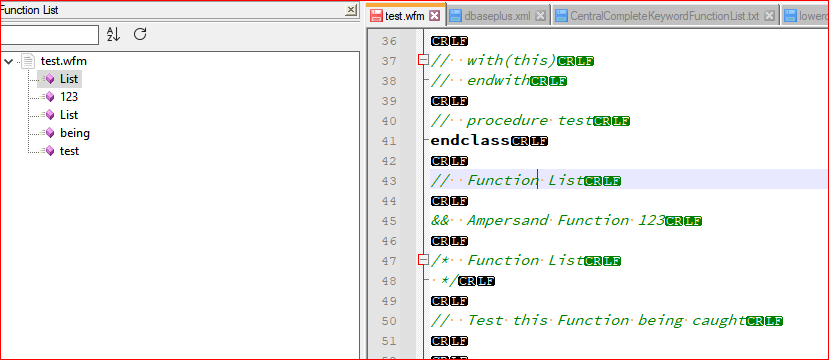
Screenshot 2 shows that after adding the parens, and reloading the FunctionList, the commented code is now invisible to the FunctionList:
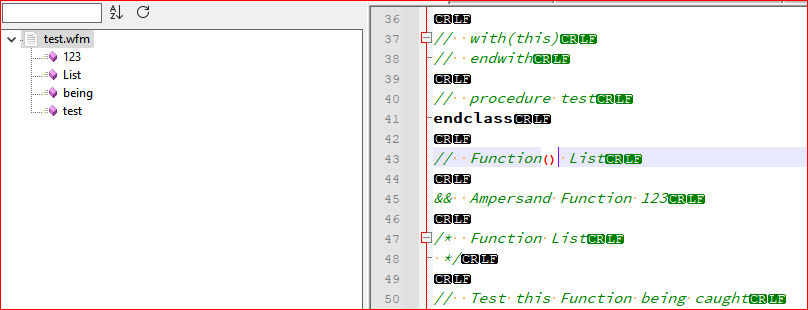
So, I may have coded my regex improperly (other than the misnaming I did, that I fixed), or this is a weird bug maybe? The same code is used in the Class/Function class range, which is why I enclosed it in a class/endclass construct to see if was persistent or seperately problematic.
Lee
-
@lycan-thrope,
Equally problematic is that looking at the screenshot now, I just noticed that the Class/Endclass construct, is not showing as a class inside the FunctionList.Hmmm…
Lee
-
@lycan-thrope
Never mind, just remembered it has to have an UNcommented function to show in the list. :-(. DOH!! -
@lycan-thrope said in FunctionList Confused:
There seems, according to this forum code highlighting, to be a difference in highlighting, that to me, says there’s a typo somewhere
Just a quick FYI: you really shouldn’t rely on this forum’s syntax highlighter to accurately determine whether or not you have valid XML. It wasn’t built for that. (The Notepad++ plugin XML Tools would be a much better choice for such checking.)